‘Cats’ by Andrew Lloyd Webber isn’t my favorite musical because, while it is visually brilliant and beautifully sung, the story is very light and minimal and the style is very dated. Nevertheless, the show was the longest-running musical from the early 1980’s until the late 90’s and started the long trend of family-friendly mega-blockbusters on Broadway. Based on a collection of poems by T.S. Eliot, ‘Cats’ the musical introduces one Jellicle cat, it sings a dynamic number and gets cast aside among the ensemble, rinse and repeat, like fashion models on the runway. As for Cats the movie, Tom Hooper gives an already incoherent narrative a plot so the movie would seem real to the cinematic eye. Victoria the White Cat (Francesca Hayward), who has no dialogue and one dance number in the show, is the main character who goes through a journey, I guess, but barely does anything to earn her Jellicle trophy. Macavity (Idris Elba) has more screen time than the episodic show as the antagonist who kidnaps other Jellicle cats: Asparagus (Ian McKellan), Jennyanydots (Rebel Wilson), Bustopher Jones (James Corden), and Old Deuteronomy (Judi Dench). Lastly, Hooper feeds the script with terrible cat puns on par with the ones from Catwoman and suggests an even worse adlib job from Corden and Wilson. The only redeeming value in Cats the movie is the song soundtrack, performed by giants like Jennifer Hudson and Taylor Swift. Even ballerina Miss Hayward produces a beautiful innocent voice in her feature debut to incorporate with her dancing talents. Beyond that, I’ll forgive the hideous humanoid cat special effects, but with the story mixed into an already plotless musical, Cats was a complete mess.
(1 ½ Scary CGI Jellicles out of 5)
|
Points: 8678
mhthehammerAdd mhthehammer as a friendmhthehammer will be notified and will have to accept this friendship request, to view updates from mhthehammer and their ratings you must follow them. |
About me
Favorite movie of all time: My Left FootLists
|
3 votes
Best Picture Nominees (in Ten Sentences)
(478 items)Movie list by mhthehammer Published 4 years, 11 months ago
My favorite Best Picture Winners (Worst to Best))
(92 items)
Movie list by mhthehammer Published 5 years, 6 months ago
1 votes
Best Picture (in Ten Sentences)
(92 items)Movie list by mhthehammer Last updated 5 years, 6 months ago
|
Recent reviews
All reviews -
Movies (43)
Cats review
 Posted : 5 years, 6 months ago on 12 June 2020 07:25
(A review of Cats)
Posted : 5 years, 6 months ago on 12 June 2020 07:25
(A review of Cats) 0 comments, Reply to this entry
0 comments, Reply to this entry
Holmes & Watson review
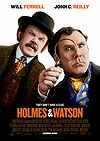 Posted : 5 years, 6 months ago on 12 June 2020 07:21
(A review of Holmes & Watson)
Posted : 5 years, 6 months ago on 12 June 2020 07:21
(A review of Holmes & Watson)Holmes & Watson is another comedic take on the iconic mystery series by Sir Arthur Conan Doyle. In this movie, Sherlock Holmes (Will Ferrell) and Dr. John Watson (John C. Reilly) are assigned to investigate the perpetrator of Queen Victoria’s (Pam Ferris) future death on the Titanic. The murderer is their housekeeper Mrs. Hudson (Kelly Macdonald), who is a descendant of Dr. Moriarty (Ralph Fiennes), but don’t expect me to analyze her plan because the movie doesn’t care. Holmes & Watson is nothing but a barrage of predictable slapstick, insultingly deadly sexual jokes and painful meandering Victorian versions of modern-day references. Not to mention, there’s an out-of-the-blue song sequence written by Alan Menken, who probably cashed his big paycheck for a pension fund and must have been ashamed penning such garbage. As for pop culture references, we get numerous allusions to Donald Trump’s America, mentions of Fourth Wave feminism, and a cameo from Billy Zane at the end. Speaking of, the most insulting anachronism of all, aside from the drunken telegram sexting and the selfie from the Queen, the RMS Titanic was constructed in 1908 and launched in 1912, several years after Victoria’s death. Not only that, the ship sailed not in London but in Southampton, tens of miles away. I know it’s pointless to rag on a movie with nothing but comedic anachronism, but the Titanic ship is intentionally part of the storyline, one set in the nineteenth century where most Sherlock Holmes stories take place. Holmes & Watson is not only a downfall for Will Ferrell and John C. Reilly’s careers, but also an insult to history, Arthur Conan Doyle’s legacy and comedic intelligence.
(1 Victorian Selfie out of 5)
(1 Victorian Selfie out of 5)
 0 comments, Reply to this entry
0 comments, Reply to this entry
The Emoji Movie review
 Posted : 5 years, 6 months ago on 12 June 2020 07:17
(A review of The Emoji Movie)
Posted : 5 years, 6 months ago on 12 June 2020 07:17
(A review of The Emoji Movie)Is the first animated Razzie Award winner The Emoji Movie the worst film of the year? Gene (T.J. Miller) is a ‘meh’ emoji inside a kid’s iPhone who wants to be a wide variety of expressions. Once he accidentally glitches the phone, he crosses the threshold and exits Textropolis with his band of misfits Hi-5 (James Corden) and Jailbreak (Anna Faris), going through all sorts of Apps like CandyCrush, Just Dance, Spotify, and Dropbox, to escape from the bots hired by Smiler (Maya Rudolph). The obvious message in the film is that technology connects people together, so buy an iPhone and text an emoji to show your love for another. Hearing that flimsy and gimmicky moral, I saw The Emoji Movie as a 90-minute commercial for Sony products, with all the features installed such as a half-baked story, uninspired characters, and obnoxious puns, but colorful imaginative worlds. As for Alex, the phone’s owner who sends a text to let go of his comfort zone, he is no Riley from Inside Out. The boy is just as dreadfully boring as all the other phone-ridden schoolmates, including his girl crush, and the apps and emojis don’t do much to support his character arc. Also, the film missed an opportunity to have the emojis escape the phone world and enter the WiFi network, where they might accidentally damage the system causing chaos in not just the school but the world. This could have been a unique children’s satire tackling the impact of technology among humans. However, The Emoji Movie and Sony exist to only advertise trendy electronics rather than glorifying the art of cinema.
(1 ½ Thumbs Down Symbols out of 5)
(1 ½ Thumbs Down Symbols out of 5)
 0 comments, Reply to this entry
0 comments, Reply to this entry
Hillary's America: The Secret History of the Democratic Party review
 Posted : 5 years, 6 months ago on 12 June 2020 07:16
(A review of Hillary's America: The Secret History of the Democratic Party)
Posted : 5 years, 6 months ago on 12 June 2020 07:16
(A review of Hillary's America: The Secret History of the Democratic Party)I have to admit, when the 2016 presidential election happened, I didn’t pay so much attention to the debates and controversy on social media because the strong oppositions toward Donald Trump and praise on Bernie Sanders and Hillary Clinton were spiraling violently out of control. However, I also heard scathing reviews for the right-winged documentary Hillary’s America, calling it “propaganda,” and “parade for hatred,” yet I decided to watch it for curiosity's sake. Hillary’s America is created by Fox News commentator and conspiracy theorist Dinesh D’Souza, who’s well-known, at least to Liberals and Democrats anyway, for distorting and exaggerating facts for the conservative viewer. In his documentary, he compares the Democrats during Andrew Jackson’s presidency to those during Hillary Clinton’s presidency. However, my complaints about the film aren’t based on the inaccuracies of the left-winged party, D’Souza’s lack of knowledge between the Pre-Civil War and modern Democrats, or any of the other problems other reviewers stated. Instead, my problems are based on the beyond amateurish cinematography, which showed too much nose room and empty space, the actors playing Jackson and Clinton, which barely resembled the respected figures, and the jarring change of style in shooting the flashback segments, which resembled more like a cinematic movie rather than footage from real people. This is especially wasted because D’Souza could have done a vox pop on regular people’s viewpoints of the modern-day Democratic Party and even InfoWars interviews on Youtube. Instead, he hires some random minority actor to play a prison thug and act out a drug smuggling scene to pose as actual evidence. On top of that, if you want to become a documentary filmmaker, always shoot handheld instead of a tripod; otherwise the illusion of the work’s dichotomy looks phony and staged. In other words, Hillary’s America doesn’t work not because of its content but rather the presentation of the content.
(1 Fake Hillary Clinton Concealed in Shadow out of 5)
(1 Fake Hillary Clinton Concealed in Shadow out of 5)
 0 comments, Reply to this entry
0 comments, Reply to this entry
Fifty Shades of Grey review
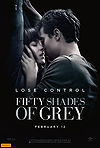 Posted : 5 years, 6 months ago on 12 June 2020 07:13
(A review of Fifty Shades of Grey)
Posted : 5 years, 6 months ago on 12 June 2020 07:13
(A review of Fifty Shades of Grey)Remember when everybody was talking about the book Fifty Shades of Grey by E. L. James? Do you also remember the equally terrible movie adaptation on Valentine’s Day weekend in 2015? The story of Anastasia Steele (Dakota Johnson) and her sadomasochistic relationship with young businessman Christian Grey (Jamie Dornan) has been the most entertainingly awful piece of literature and a subject of parody in the first half of the 2010 decade. What made the novel so infamous were the exaggerated sex scenes and the laughable internal monologue. The movie however, trims those elements down in favor of a conventional romantic drama instead of raising the bar with James’s text. Don’t get me wrong, Fifty Shades of Grey isn’t without saucy moments, but there are so few drips to squeeze and they get bogged down by scenes of Mr. Grey gawking Anastasia with materialism, stalking her at dinner parties, or sending creepy text messages. Christian has an entire collection of whips, butt plugs, and other BDSM sex toys, yet he never takes advantage of them in the movie. With the funny narration being replaced by generic pop songs, the film also loses its charisma and never explores Annie’s lustful desires. I’m not asking for this movie to be ultra-pornographic, but I expected more steamy activity than just hard spanking and rubbing ice on the nipples. Despite Sam Taylor-Johnson’s effort to better the book’s prose, the result of Fifty Shades of Grey is extremely mild and not the least bit titillating.
(1 ½ Exploding Inner Goddesses out of 5)
(1 ½ Exploding Inner Goddesses out of 5)
 0 comments, Reply to this entry
0 comments, Reply to this entry
Fantastic Four review
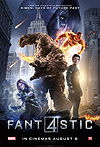 Posted : 5 years, 6 months ago on 12 June 2020 07:11
(A review of Fantastic Four)
Posted : 5 years, 6 months ago on 12 June 2020 07:11
(A review of Fantastic Four)Back in 2015, I saw a huge cardboard display for the new Fantastic Four movie, and I thought, “Oh no, is this gonna be one of those movies where it’s coated in that ugly desaturated earth and metal tones?” So, I didn’t watch it because I wasn’t into Marvel movies in general, but it might be a critical success regardless. However, this movie describing the origins of the team, which includes Mr. Fantastic (Miles Teller), Invisible Girl (Kate Mara), Human Torch (Michael B. Jordan) and Thing (Jamie Bell), and their plot to defeat the evil Dr. Doom (Toby Kebell) had been critically thrashed, warranting a 5% rating on Rotten Tomatoes. Well, after seeing this, part of me can see why, but on the other hand, on the other perspective, it’s not exactly worthy of a low rating. The story splits into two segments: Reed Richards building the dimensional transporter and the four superheroes fighting Von Doom. Although the story takes itself way too seriously, most of the movie is shot in the dark, and the most of the action happens in the background, Josh Trank’s Fantastic Four is competent on visual effects, the musical score by Marco Beltrami and Philip Glass, and the performances by Teller, Mara, Jordan and Bell. Most of the faults in the movie come from producer and co-writer Simon Kinberg, who wanted to capitalize on the success on The Avengers and X-Men and make a realistic version of Jack Kirby and Stan Lee’s story. His obsession with dimming the lights and desaturating every scene makes a chunk of the movie unwatchable and drab. On top of everything else, Trank tweeted that he wanted to be faithful to the source material except with a body count, resulting in a drastic tug of war game between him and Marvel. Despite the messy storyline and blatant studio intervention, Fantastic Four wasn’t a good movie, but I’m glad I saw it.
(2 ½ Black Hole Sky Portals out of 5)
(2 ½ Black Hole Sky Portals out of 5)
 0 comments, Reply to this entry
0 comments, Reply to this entry
Saving Christmas review
 Posted : 5 years, 6 months ago on 12 June 2020 07:08
(A review of Saving Christmas)
Posted : 5 years, 6 months ago on 12 June 2020 07:08
(A review of Saving Christmas)If you looked at the poster of Saving Christmas and expected a fun family action comedy featuring the actor from “Growing Pains,” get ready to be disappointed. Kirk Cameron, the formerly popular teen actor turned born-again Christian, is off to save Christmas and what does he do? He stalls inside a car with his brother-in-law Christian (Darren Doane) and lectures to him and the audience about the true meaning of Christmas and the birth of Jesus. Saving Christmas is more about inflating Cameron’s ego than spreading the holiday cheer to all your friends. Despite being a Christian, Cameron contradicts his own religious philosophy of love and forgiveness and suggests that Saint Nicholas, the originator of Santa Claus, murdered heretics when not giving presents. I guess Cameron was trying to be ironic with his “Lord of the Ringsy” take on the figure, but instead it comes off as mean-spirited, especially in a Christmas movie. To be fair, the joke might have worked in a tongue-and-cheek sense, if the other characters weren’t so poorly-written. Christian is a one-dimensional Scrooge in the mud, the atheist conspirators contribute nothing and neither do any of the party-goers, including Kirk’s sister Bridgette, except a dance number. Seeing the characters’ lack of onscreen presence only adds to Kirk Cameron’s overlong sanctimonious preachiness; that’s me as a film lover in general. If Kirk Cameron is reading this post (I seriously doubt that he is), I apologize for being a “hater and atheist,” but Saving Christmas wasn’t very good.
(1 Hot Cocoa in a Mike Seaver Mug out of 5)
(1 Hot Cocoa in a Mike Seaver Mug out of 5)
 0 comments, Reply to this entry
0 comments, Reply to this entry
Movie 43 review
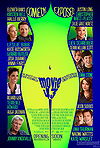 Posted : 5 years, 6 months ago on 12 June 2020 07:04
(A review of Movie 43)
Posted : 5 years, 6 months ago on 12 June 2020 07:04
(A review of Movie 43)Omnibus films featuring big names can work as long as the product works well, but Movie 43 fails as it combines the series of shorts into one narrative. There are two versions of the film: One takes place in a producer’s conference and the other takes place at a teenager’s home before an apocalypse. Some segments have missing payoffs like the one where a grocery clerk Neil (Kiernan Culkin) falls in love with Veronica (Emma Stone) or Batman (Jason Sedakis) giving dating advice to Robin (Justin Long). Others, like the one where Beth (Kate Winslet) goes on a date with millionaire Davis (Hugh Jackman), the one where Amanda (Chloe Moretz) experiences her first menstrual cycle, and the one where a man (Chris Pratt) takes laxatives to show his love for his fiancée (Anna Faris) are just an excuse to throw out gross-out jokes. Meanwhile, it throws in socio-political commentary in these sketches, like the sexist ad executive (Richard Gere) pitching the product iBabe to his staff or the 1950’s coach (Terrence Howard) teaching the first all-black basketball team. However, other segments are okay, like the game of truth of dare between Stephen Merchant and Halle Berry, the one featuring a gay cartoon cat or a birthday present involving a leprechaun (Gerard Butler). You know your project is in trouble when you title it Movie 43 because these rejected CollegeHumor sketches seem like they were filmed before the producers came up with the title. It especially doesn’t work when they bookend these vignettes with a lazy and last minute narrative. I do not object to shock and gross-out comedy, in fact, as a teen, I watched a good chunk of lowbrow shows like “Robot Chicken” and “Family Guy.” Whereas those were handled with contextual intelligence, Movie 43 is a limp, desperate attempt from over fifteen directors to throw every adult humor on the screen resulting in a giant mess.
(1 ½ Balls on Chins out of 5)
(1 ½ Balls on Chins out of 5)
 0 comments, Reply to this entry
0 comments, Reply to this entry
The Twilight Saga: Breaking Dawn: Part 2 review
 Posted : 5 years, 6 months ago on 12 June 2020 07:01
(A review of The Twilight Saga: Breaking Dawn: Part 2)
Posted : 5 years, 6 months ago on 12 June 2020 07:01
(A review of The Twilight Saga: Breaking Dawn: Part 2)To tell a tale out of school, out of all the horrible Worst Picture Razzie winners, Twilight: Breaking Dawn Part 2 was the main reason I retained from doing this marathon in the first place. On top of not getting into the teenage vampire and werewolf trend in early 2010’s, I didn’t want to expose myself to the cinematic bubonic plague known as the Twilight franchise. Unfortunately, the 8-year record is broken as I have now seen one of their movies, the final one. Previously, Bella Swan-Cullen (Kristen Stewart) gave birth to Edward Cullen’s (Robert Pattinson) half-vampire baby Renesmee (Mackenzie Foy). In Part 2, Bella and Edward’s love-child brings a conflict between the Cullen family, the pack of werewolves lead by Jacob Black (Taylor Lautner) and the Volturi cult led by Aro (Michael Sheen). Having not seen the other films or read the Stephanie Meyer books, I could never follow why being immortal would be a threat to the Volturi vampires or how the vampires inexplicably gain powers like chopping logs like a cheese cracker, superspeed, or super-jump. It also didn’t help that the visual effects are far below the standards of a Sci-Fi channel movie, demonstrated by the werewolves, motion blurs, the backdrops, and the baby. Another list of stupidity: Bella learning to act human, the elemental powers that contribute nothing to vampirism, the ethnic stereotypes, and the climactic battle near the end which was all a vision. The only redeeming and entertaining value in the whole series so far is Michael Sheen, who bites the scenery gloriously and even has that silly hammy laugh as an act of threat. While nicely shot and not with some crazy and funny moments, Breaking Dawn Part 2 is still a poorly written, poorly acted and poorly directed mess.
(1 ½ Ugly CGI Renesmee Cullens out of 5)
(1 ½ Ugly CGI Renesmee Cullens out of 5)
 0 comments, Reply to this entry
0 comments, Reply to this entry
Jack and Jill review
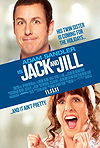 Posted : 5 years, 6 months ago on 12 June 2020 06:58
(A review of Jack and Jill)
Posted : 5 years, 6 months ago on 12 June 2020 06:58
(A review of Jack and Jill)I want to make this as clear as possible: when I was a teen, I enjoyed watching the dumb comedies by Adam Sandler and Happy Madison. However, as I got older, my admiration of those movies faded, especially after watching arguably his worst project yet, Jack and Jill. The premise is about Jack (Adam Sandler) whose long-lost twin sister, Jill (also Sandler), arrives at his house and stays from Thanksgiving to Hanukkah. Other goofy antics involve a Mexican illegal immigrant Felipe (Eugenio Derbez) whom Jill falls in love with, a sponsorship from Dunkin’ Donuts, a trip to a cruise ship, and a stalking Al Pacino. While not my least favorite movie, it was still insufferable to sit through, even with Sandler’s gratingly tired bad taste routine and his annoying female voice. However, as the movie continued, his falsetto became infectious and made me feel the possible promise for a voice over role for the former SNL comedian. The worst scenes involve Al Pacino, one of the greatest and most inspiring actors of all time, reduced to a pervert and spokesman for a mediocre donut chain. Of all the ludicrous moments in Jack and Jill, the ultimate all time low came from a scene where Pacino performs “Richard III'' on Broadway and his cell phone rings during the show. Being a guy who has taken acting classes, I felt ashamed seeing the Oscar-winning actor put it in his costume, taking that phone call in the middle of his performance, and immaturely taking anger on the audience, instead of letting the anger affect his performance like any actor with a 50-year resume in his belt. I swear it took at least an hour before I calmed myself down, suspended my disbelief, and carried on watching one of Sandler’s weakest films.
(1 David Spade in Drag out of 5)
(1 David Spade in Drag out of 5)
 0 comments, Reply to this entry
0 comments, Reply to this entry
Movies
Top rated |
 My movies page My movies page Rated 626 movies Rated 626 movies |
TV
 My tv page My tv page |
My feed
mhthehammer added 1 item to Best Picture Nominees (in Ten Sentences) list
In the 1940’s, English film studios jumped in the trend of well-disguised national propaganda pictures, ones that glorified the Allied countries while antagonizing the Axis Power coalition of Nazi Germany. Nowhere has there been a primal example of this than Noel Coward’s "In Which We Serve." The movie tells a story about the Royal Navy crew in the shipwrecked HMS Torrin. Whereas, it flashes back between the seamen struggling to survive in a lifeboat and their effort to construct the ship, under the command of Captain Kinross (Noel Coward). "In Which We Serve" also recounts the happy marriages between Seaman Shorty Blake (John Mills) and Freda (Kay Walsh), Kinross and Alix (Celia Johnson), and Chief Petty Officer Hardy (Bernard Miles) and Kath (Joyce Carey). Meanwhile, our heroes at sea patriotically treasure these memories before they meet their makers and witness their battleship sinks. Despite this being spoken from Noel Coward’s voice and eyes, "In Which We Serve" introduced the world to David Lean, a man who previously edited films like "49th Parallel" and "Pygmalion." Even though he is credited as editor and co-director, he holds accountable for the best part of capturing Coward’s patriotism. The way he shoots the battle sequences and the ship sinking creates a sense of realism and an epic scale, the style that would eventually become a trademark in his future work. Aside from that, "In Which We Serve," while a relevant movie for its time, is above average. (3 ½ “Freda” Tattoos out of 5)
4 years, 7 months ago
mhthehammer added 1 item to Best Picture Nominees (in Ten Sentences) list
Alfred Hitchcock on top of being the maestro of suspense, is one of the most versatile directors in the world. He has made espionage thrillers, screwball comedies, and romantic thrillers, like "Suspicion," pitched during his time working for RKO Pictures and David O. Selznick. In this film, Lina (Joan Fontaine) marries a mysterious English gentleman Johnnie Aysgrath (Cary Grant) and lives a seemingly happy life. As their marriage progresses, Lina grows more suspicious about her new husband, who hides his embezzlement plot and penniless gambling ambitions over her eyes, supposedly murdered his best friend Beaky (Nigel Bruce) in Paris, and, according to her, vows to do the same to her. The always reserved Hitchcock proves to be the best person to direct the film after glorifying mystery romances in "Rebecca." "Suspicion," while not as groundbreaking, churns up a handful of subtlety, even though the ending is a bit rushed. It starts off very merry and witty, but as the film goes further into the plot, it gets more and more disturbing, building up the suspicion of Johnnie’s supposed murderous intentions. From the beginning of his marriage Johnnie lied to his wife about his financial pursuits, sold two chairs from their honeymoon for gambling bets, and thought about stealing money from Lina’s life insurance. In fact, "Suspicion" would have been more powerful if Johnnie ended up over a cliff after attempting to push Lina out of the car, instead of pulling over, telling her the truth, and driving back home. Even though Hitchcock’s vision seemed heavily mandated by the Hollywood studio system, "Suspicion" spells his name all over. (4 Monkey Faces out of 5)
4 years, 8 months ago
mhthehammer added 1 item to Best Picture Nominees (in Ten Sentences) list
In Alfred Hitchcock’s second Hollywood picture since his leave from the United Kingdom, Johnny Jones (Joel McCrea) is an American reporter assigned to cover a gripping scoop in Europe. The inside story involves the plot against Dutch diplomat Van Meer (Albert Basserman) concocted by Henry Fisher (Herbert Marshall) and his German spies. Jones and his allies Carol Fisher (Laraine Day) and Scott ffolliott (George Sanders) must retrieve the conspiracy before they get killed and World War II begins. While quintessentially Hitchcockian in every sense, "Foreign Correspondent" can only be described as an American suspense adventure film disguised as a pro-British war propaganda film. If not for the rise of the Third Reich and the concerns of World War II spreading overseas from Europe, "Foreign Correspondent" would not be different from any of his past espionage films. In fact, it seems that Hitchcock was trying to remake "The 39 Steps," a film about a man trying to stop a British government agency from stealing military secrets. However, the one scene that stands out from his filmography is the bait-and-switch part where Fisher’s bodyguard Rowley (Edmund Gwenn) pushes Jones off Westminster Cathedral tower. Rowley pushed him out of traffic while crossing the street, but the minute Jones saw the elevator going up and him trying to shove him off, he stepped aside and let him plummet to his death. Part of why the scene was the most effective comes from the build up from the friendly conversation between the two that stretches further until the rubber band snaps. So, in a film like "Foreign Correspondent," Alfred Hitchcock’s use of suspense is what makes him a brilliant auteur. (4 Newspaper Snowflakes out of 5)
4 years, 8 months ago
mhthehammer added 1 item to Best Picture Nominees (in Ten Sentences) list
Josef Von Sternberg’s "Shanghai Express" is one of those movies that’s known less for its story and more for its camerawork. The premise is set inside a train heading to Shanghai, where Lt. Donald Harvey (Clive Brook) reunites with his old flame Madeline (Marlene Dietrich), a prostitute who goes by the cognym “Shanghai Lily”. While their romance is put to question, the express train is held hostage by Chinese civil war forces led by a Eurasian spy Henry Chang (Warner Orland), who terrorize the passengers, including Hui Fei (Anna Mae Wong). Most people call it “'Grand Hotel' on wheels,” being a movie centered on the adventures of multiple characters inside a titular setting. However, in "Shanghai Express," one linear plot thickens around the people instead of them interacting with each other in a loose story. As such, the film feels less a piece of cinematic influence and more of a crowd-pleasing 1930’s novelty from Hollywood. Where "Shanghai" really stands out is the stylistic chiaroscuro lighting by Lee Garmes. For those of you who don’t know, chiaroscuro is the practice of using contrasting light and shadows made by a light downcasted on an object. For this movie, Sternberg uses the effect to create expressionist silhouettes on the rebels soldiers or cast a low angle rigging light on Lily in the tense scenes, similar to the black-and-white film noirs of decades later. While not a memorable movie from a plot standpoint, "Shanghai Express" was one of the biggest landmarks of visual storytelling. (3 ½ Blue Lotuses out of 5)
4 years, 8 months ago
mhthehammer added 1 item to Best Picture Nominees (in Ten Sentences) list
In the mid-19th Century, Catherine Sloper (Olivia de Havilland), the wealthy daughter of Dr. Austin Sloper (Ralph Richardson) falls in love with Morris (Montgomery Clift), who promises to marry her. Dr. Sloper tells her she will be disinherited from a $10,000 fortune because of his suspicions of Morris robbing her money. However, Morris' trust is put to the test when he finds out about the will and storms off, thereby breaking Catherine’s heart and allowing her to plot revenge against him. Released in 1949, "The Heiress" is an adaptation of a Broadway play on the same name by Augustus and Ruth Goetz, which in turn was adapted from the novel “Washington Square.” On top of that, this movie tells one of those stories where a naive and spoiled woman has to learn to face reality. Unlike "Gone with the Wind," "The Heiress" has a nihilistic take on the message, although the story starts off as innocent. Catherine, unlike Scarlett O’Hara, matures quicker the minute she learns of her father’s withering life and the fact that Morris lied to her before they elope. Also, instead of waiting for her true love to marry her one day, she locks him outside her house and trims away the lights, wearing a wicked grimace. So, "The Heiress" doesn’t just become a costume period romance filled with father-in-law conflicts. Instead, it’s a cautionary fable about marital betrayal and high-class loyalty. (4 Ruby Buttons out of 5)
4 years, 8 months ago
mhthehammer added 1 item to Best Picture Nominees (in Ten Sentences) list
In "Marriage Story," Charlie (Adam Driver) and Nicole (Scarlett Johannson) get involved in a coast-to-coast divorce. Charlie is struggling to keep his directing career in New York City while Nicole is trying to find herself while living with her family and expand her acting career in Los Angeles. Both are caught in a battle for custody for their son Henry (Azhy Robertson) and a war between their lawyers Nora Fanshaw (Laura Dern) and Jay Marotta (Ray Liotta), who exaggerate their stories. On top of being one of the best films of 2019, "Marriage Story" is a combination of the modern saying “write what you know” and the more prefered saying “write what you want to know.” Noah Baumbach, who has touched on divorce in "The Squid and the Whale," wanted to authentically depict the marital struggle. For inspiration, he drew inspiration from his separation from Jennifer Jason Leigh and custodial battle over their son. As such, the drama in his personal life is reflected on the conflict between Charlie and Nicole. However, the project required Baumbach to explore the broader side of the material, speaking to his best friends, litigators, and judges. These outside resources and interviews helped him craft the courtroom rhetoric between Nora, Jay and Bert Spitz (Alan Alda) and the differences between New York and California lawyers. So for "Marriage Story," a melancholically beautiful love story about divorce, he experienced divorce, but he wanted to find out the legalities that go on during the procedure. (5 Ninja Costumes out of 5)
4 years, 8 months ago
mhthehammer added 1 item to Best Picture Nominees (in Ten Sentences) list
Imagine a murder mystery film mixed with a mindset of a Quentin Tarantino revenge plot. In "Promising Young Woman," Cassie Thomas (Carey Mulligan) is hellbent on tracking the culprit who sexually molested her best friend at a party. After investigating other suspects, including her old best friend Madison McPhee (Allison Brie), Jordan Green (Alfred Molina), a lawyer who covered Nina’s crime, and Nina’s mother (Molly Shannon), she finally meets Al Monroe (Chris Lowell), the real perpetrator, at his bachelor party, incriminates him and has the police arrest him from beyond the grave. Right from the premise I began to draw parallels between the main protagonist and other new-generation female warriors and femme fatales. Cassie’s manhunt is somewhat similar to The Bride from "Kill Bill," as both involve a vengeful purpose written on paper, in this case it’s a notepad. Her murderous eyes and predatory seductiveness while interrogating Al seem on par with Catherine Tramell from "Basic Instinct." The idea of a female anti-hero fighting against male oppression is lifted from LuckyChap Entertainment’s earlier film "Birds of Prey," a comic book film about Harley Quinn vowing revenge against Gotham City. While encompassing the aforementioned characters, Emerald Fennell makes a fresh take on her leading lady as well. While focused on getting her revenge, she stabilizes the relationships with her parents (Jennifer Coolidge and Clancy Brown) and, to a lesser extent, her boyfriend Ryan (Bo Burnham). With a complexly written character at hand, "Promising Young Woman" is an uneasy film to see, but a topical film to conceive of after the dark times of the second half of the 2010’s. (3 ½ Spit Coffee Cups out of 5)
4 years, 8 months ago
mhthehammer added 1 item to Best Picture Nominees (in Ten Sentences) list
Fresh from the Cannes Film Festival came Jane Campion's critically acclaimed feature called "The Piano." In the 19th Century, Ada McGrath (Holly Hunter) travels from Scotland to New Zealand to be set for an arranged marriage by Alistar Stewart (Sam Neill) with her handcrafted piano and her daughter Flora (Anna Paquin). The relationship between him and the mute Ada is less than intimate as she cares more about her piano than her future-husband. However, her Maori-tattooed neighbor George Baines (Harvey Keitel) offers intimate favors in exchange for his land and eventually sparks fly and a love triangle ensues. Ada’s piano in "The Piano" is her only symbolic voice throughout the film, while Flora serves as her interpreter and Ada’s only method of communication is either British Sign Language or her notepad. As such, "The Piano" is about desire from the heart, as each character yearns for something and must follow their path to achieve it. Alistair’s dream is to spawn a family of his own while settling colonies in Maori territory. Ada’s wish is to find love without speaking as she lost her vocal ability when she was young and cannot understand why. George’s desire is to have a passionate connection with a woman and he does after “offering Ada piano lessons.” Alistair’s motivation is weak according to the Scottish woman, but George proves to be a perfect match for her because he speaks from the heart as opposed to the mind. (4 ½ Metal Fingers out of 5)
4 years, 9 months ago
mhthehammer added 1 item to Best Picture Nominees (in Ten Sentences) list
In Los Angeles, Laser (Josh Hutchinson) and Joni (Mia Wasikowska), the children of a same-sex lesbian couple Nic (Annette Bening) and Jules (Julianne Moore), contact with the anonymous sperm donor Paul (Mark Ruffalo), an owner of an organic foods restaurant. Once Jules is hired to design Paul’s backyard, Nic becomes more jealous and emotionally distant from her and discovers Jules partaking in a bisexual affair. Based on the advertising, I knew that "The Kids Are All Right" focused on two children of a gay couple. What I didn’t expect was that the movie centered on a love triangle that would briefly tarnish said marriage and reveal how lesbian couples gave birth to children. In fact, Lisa Cholodenko made a similar film called "Laurel Canyon," which also was about a love triangle that put the main character’s sexual orientation to the test. Also, both films have been critically lauded for the lead’s performances, Ruffalo, Bening and Moore against Christian Bale, Kate Beckinsale, and Frances McDormand. Unlike "The Kids Are All Right," "Laurel Canyon" explored heterosexual relationships and neo-counterculturalism in the Santa Monica area. Also, unlike the former film where Nic and Jules reconcile and everything turns out fine, the latter film's ending is left uncertain whether the couple end happily together. While both are okay, I enjoyed "Laurel Canyon" slightly more than "The Kids Are All Right." That film is more personal, but that unfortunately is sheltered by a formulaic story with a more predictable resolution. (3 Scrabble Boards out of 5)
4 years, 9 months ago
mhthehammer added 1 item to Best Picture Nominees (in Ten Sentences) list
In the rural Ozark territory, 17-year-old Ree Dolly (Jennifer Lawrence) is told by Police Chief Baskin that her father Jessup is arrested for drug possession and is expected to show up on trial. To support her family from eviction, Ree has to find her father and have him pay the bondsman Mike Satterfield (Tate Taylor) within one week. She talks to several suspects including her meth-addicted uncle Teardrop (John Hawkes), the head of the meth lab Thump Milton (Ronnie Hall), and his wife Merab (Dale Dickey), to gather information about Jessup's whereabouts. It turns out, Jessup died from a meth lab fire and the Miltons dumped the body in a bog and cut up his hands with a chainsaw before the trial. Being a sucker for mystery dramas, I like to decypher the story behind the murder and possibly gather clues to support the scene of the crime. Plus, the movie has its visual flourishes, such as the cold grey-blue scheme, the Edward Goriesque leafless trees, the rusty junkyard, and the creepy icicles on the railings. However, "Winter’s Bone" loses me with its obvious themes of female dominance and patriarchy at play. My favorite feminist films typically use the aforementioned topics as subtext, leaving multiple interpretations in theme or angles of enjoyment. While "Winter’s Bone" has other themes as well such as societal merit, hope and familial distance, the subject of patriarchal threat waters them down so much that only one level is allowed to be viewed. What I’m trying to say is "Winter’s Bone" is fine for what it is, but it’s not my cup of tea. (3 Glass Boxed Stoats out of 5)
4 years, 9 months ago
mhthehammer added 1 item to Best Picture Nominees (in Ten Sentences) list
The late comedian Penny Marshall makes an against-type directing job adapting the medical study from Oliver Sacks. In her third film "Awakenings," Dr. Malcolm Sayer (Robin Williams) is hired to care for patients with encephalitis lethargica in a hospital in The Bronx. Sayer tests them with a drug L-DOPA, which causes the patients to awaken from their catatonic trance, and grows a bond with Leonard Lowe (Robert De Niro), who got infected when he was a boy in the 1920’s. Even though "Awakenings" is about Sayer’s efforts to test the drug and the side effects that go with it, Leonard takes center stage for the film. The audience roots for him as he wakes up from the disease, reconnects with his mother (Ruth Nelson), and hits up Paula (Penelope Ann Miller). Similarly, they empathize with him when the drug wears down and he tries to make his last date with Paula. Williams’s storyline is unfortunately the weakest part, with the standard plot with a protagonist making a discovery and everyone looking down on him because his ideas are crazy, except for one soul who inevitably becomes his romantic foil. After "Good Morning Vietnam" and "Dead Poets Society," the writers probably had one plot for a Robin Williams movie and copied it in every film since. Thankfully, Robert De Niro’s performance and subplot serves as the saving grace for this otherwise tired premise. Overall, "Awakenings" has its brilliant and emotional moments, but the film is above average. (3 Tennis Balls out of 5)
4 years, 9 months ago
 Login
Login
 Message
Message
 Home
Home 3 Lists
3 Lists 43 Reviews
43 Reviews Collections
Collections















































